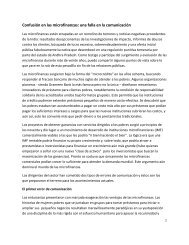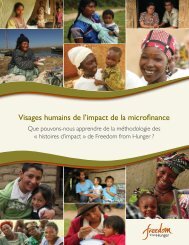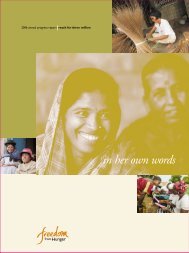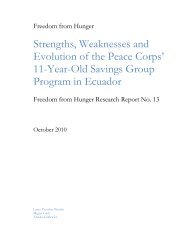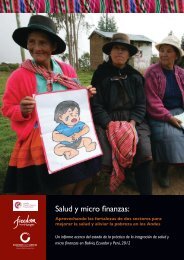Voices from the Frontlines: - Freedom from Hunger
Voices from the Frontlines: - Freedom from Hunger
Voices from the Frontlines: - Freedom from Hunger
Create successful ePaper yourself
Turn your PDF publications into a flip-book with our unique Google optimized e-Paper software.
often leave to <strong>the</strong> competition because <strong>the</strong>y are offered objects (gifts, prizes, etc.). The groups at CRECER are fine<br />
but members complain about not getting prizes and want little objects or prizes.”<br />
The o<strong>the</strong>r four organizations face similar challenges. In addition to gifts, clients want o<strong>the</strong>r<br />
forms of recognition for <strong>the</strong>ir loyalty to <strong>the</strong> organization. One client shared that she had been a<br />
member for 13 years and never missed a payment and that she should receive prizes for that.<br />
The credit officers agree: “[We] should dedicate [ourselves] more to <strong>the</strong> members, through organizing festivals<br />
and health fairs. [We] should reward punctuality, and give prizes or recognition to members who pay on time.” In<br />
some cases, <strong>the</strong>y felt <strong>the</strong> need to provide gifts and o<strong>the</strong>r expressions of appreciation is quite<br />
extreme:“We explain to <strong>the</strong>m and even kind of lie to <strong>the</strong>m that soon we’ll offer what <strong>the</strong>y need so <strong>the</strong>y stay.<br />
Sometimes we have to buy things <strong>from</strong> our own pockets, like gifts, to make <strong>the</strong>m happy. I have shared my ideas<br />
with [my organization] many times. We share <strong>the</strong>m in our meetings and trainings but <strong>the</strong>y can’t buy gifts for <strong>the</strong><br />
clients because <strong>the</strong>y don’t have <strong>the</strong> funds.”<br />
3. Credit officers think most of <strong>the</strong>ir clients are benefiting <strong>from</strong> <strong>the</strong> services <strong>the</strong>y receive.<br />
When <strong>the</strong> credit officers were asked to estimate <strong>the</strong> percentage of <strong>the</strong>ir clients who were “better<br />
off,” “about <strong>the</strong> same” or “worse off,” across all five organizations <strong>the</strong> estimates fell<br />
approximately in <strong>the</strong> following range: 70%–80% better off, 15%–25% about <strong>the</strong> same and 15%–<br />
25% worse off. For those clients <strong>the</strong>y estimate being worse off, <strong>the</strong> credit officers note that,<br />
most of <strong>the</strong> time, this is ei<strong>the</strong>r due to over-indebtedness or because <strong>the</strong> household has faced<br />
some negative shock, such as a health crisis or accident. One credit officer shared that “<strong>the</strong> neutral<br />
clients are those who have been with us for awhile and just want to continue participating in groups. When clients<br />
become worse off, it is generally because something bad happens in <strong>the</strong>ir lives, or <strong>the</strong>y make poor decisions and take<br />
out too many o<strong>the</strong>r loans.” Credit officers feel that those who are better off are so because <strong>the</strong>y have<br />
grown <strong>the</strong>ir businesses. Ano<strong>the</strong>r echoed much of <strong>the</strong> same sentiment: “With <strong>the</strong> access to <strong>the</strong><br />
education we provide, <strong>the</strong>y are ei<strong>the</strong>r all neutral or better off. If <strong>the</strong>y are worse off, it is not <strong>from</strong> anything we are<br />
doing.” Credit officers feel that <strong>the</strong>ir clients are better off mainly due to <strong>the</strong> fact <strong>the</strong> clients have<br />
invested and managed <strong>the</strong>ir money well and because <strong>the</strong>y’ve followed <strong>the</strong> rules. Research that<br />
<strong>Freedom</strong> <strong>from</strong> <strong>Hunger</strong> has been conducting, utilizing client interviews called “Impact Stories,”<br />
actually confirms much of what <strong>the</strong>se credit officers are saying in terms of <strong>the</strong> percentages of<br />
clients being better off, <strong>the</strong> same or neutral and <strong>the</strong> reasons for falling into <strong>the</strong>se categories. Our<br />
research has found that most clients who stay with an institution are better off or neutral, and<br />
that for <strong>the</strong> percentages that drop out or are having negative experiences, this is often due to a<br />
shock, business failure or over-indebtedness.<br />
4. Rural areas remain underserved. Most of <strong>the</strong> credit officers shared that <strong>the</strong>ir institution’s<br />
advantage is that <strong>the</strong>y are reaching rural or isolated communities, which remain relatively<br />
unserved. However, <strong>the</strong>y feel products, policies and procedures do not always help <strong>the</strong>m to meet<br />
<strong>the</strong> realities of rural clients. For example, at one organization, one of <strong>the</strong> biggest complaints<br />
<strong>from</strong> credit officers and supervisors alike was that <strong>the</strong> credit officer was located far <strong>from</strong> <strong>the</strong><br />
communities and clients <strong>the</strong>y served. Ano<strong>the</strong>r credit officer shared <strong>the</strong> same: “I would change some<br />
requirements. Women <strong>from</strong> rural zones have to come here to Huancayo for <strong>the</strong>ir dispersals; it would be better to<br />
<strong>Voices</strong> <strong>from</strong> <strong>the</strong> <strong>Frontlines</strong> 15



